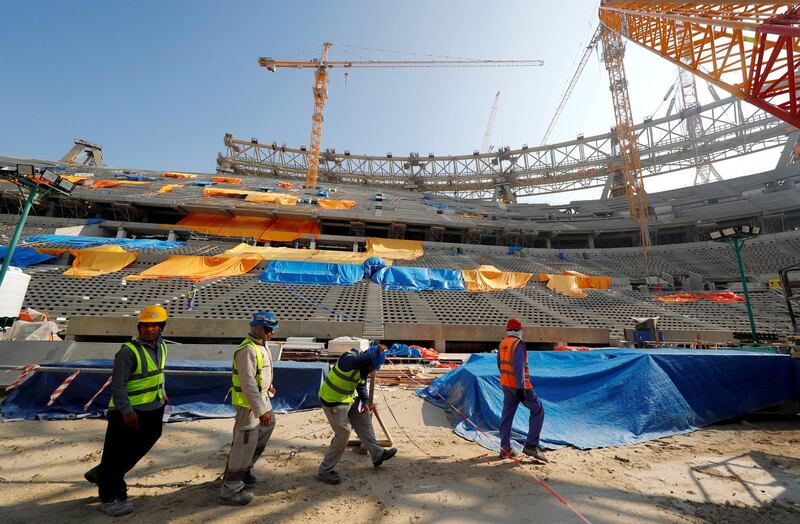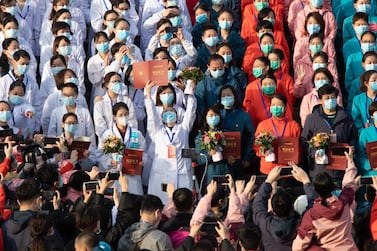Qatar has defended quarantine measures around its World Cup 2022 stadiums, where work continues, claiming they are necessary to prevent the spread of coronavirus.
In a statement issued in response to allegations made in a German TV documentary, Doha acknowledged it cordoned off an area but said testing stations and health centres were set up inside.
It also said it was acting to “guarantee that all residents who are in quarantine or undergoing treatment will receive full salaries on schedule".
Only four people are allowed in accommodation rooms, the government said.
It said other social distancing measures at the sites had been introduced, such as staggering the entry and exit of workers to and from their workplace and "limiting all bus capacity to a maximum of 50 per cent".
It claimed it would ensure masks and hand sanitisers were available at worksites.
Qatar has faced heavy criticism over the treatment of migrant workers, with some paid less than Dh4 an hour.
Qatar claims 34 workers have died in the past six years but human rights groups say the true figure is more than 1,400 and predict the death toll could increase to 4,000 by 2022.
A German documentary has revealed workers face severe food shortages and live in cramped conditions inside a quarantined part of the industrial area outside Doha.
Workers told German broadcaster ARD they were effectively detained in the lockdown area with little to eat and little protection against the virus.
They said social distancing was not possible for workers.
Qatar has a migrant labour force of more than two million, accounting for 95 per cent of its total labour force.
About 30,000 migrants are involved in its stadium projects.
Outside the quarantine zone, shops and banks in malls are closed to try to contain the virus.
Qatar has reported more than 2,000 cases of Covid-19, with six deaths.
Work on stadium construction sites continues despite Qatar closing off large parts of the industrial area due to an outbreak of the virus last month.
Doha claimed it was bringing a daily shipment of food and protective equipment into the industrial area.
With regard to health centres set up in the zone to treat coronavirus patients, Doha said workers “who do not have a valid work visa will also be treated free of charge without fear of detention or financial penalties”.
It said it would “guarantee that all residents who are in quarantine or undergoing treatment will receive full salaries on schedule”.
Doha has been urged to protect migrant workers during the pandemic.
“Qatar has made promising commitments to support migrant workers during this unprecedented crisis, including earmarking funds to cover quarantined migrant workers’ wages and setting up a hotline for grievances,” Michael Page, deputy Middle East director at Human Rights Watch, said.
“Now, more than ever, such promises need to be implemented.”
The Nepalese government says more than 1,400 of its citizens have died working on stadiums in Qatar since 2010, when the country won the contract to host the World Cup.
In June last year, Nepal and the the Philippines took steps to protect their citizens against abuses.
They called for Qatar to abide by labour standards as stories circulated of migrants who were not paid for months, had their passports confiscated and lived in spaces similar to prisons, with little food or water.
Several welfare reforms announced by Qatar last year have yet to be put into practice.







